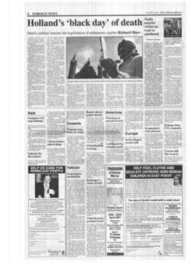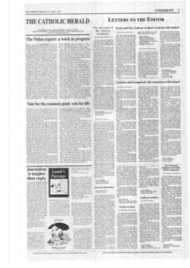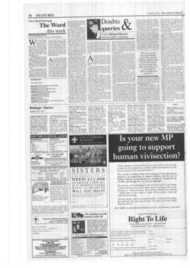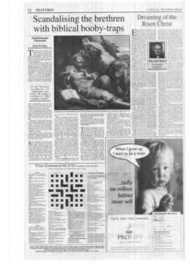Page 9, 20th April 2001
Page 9

Report an error
Noticed an error on this page?If you've noticed an error in this article please click here to report it.
Tags
Share
Related articles
Pius Xii Was 'genuinely A "righteous Gentile"
Justice To The Memory Of Pius Xii
Anti-pius Travesty
The Jews And Pius Xii By Two Writers Who Met Him
Pius Xii: The Verdict Of The Eyewitnesses
Right under his nose
Roman Jews thought Pius XII could save them. They were wrong, says Anne Sebba
Under His Very Windows: The Vatican and the Holo caust in Italy by Susan Zuccotti, Yale University Press £19.95
AT !)AWN On the cold, rainy morning of October 16, 1943, German security police surrounded the former ghetto of Rome and began knocking on every door where Jews were known to live. Hundreds of men, women and children, many still in their nightclothes, were soon shivering in the central square of the old ghetto until driven away in trucks. By 2 pm, when the round-up ended, 1,259 people had been transported to a temporary detention centre less than half a mile away from the Vatican City. Two days later, after a screening process which allowed a few releases, 1,023 Jews were sent to Auschwitz, of whom 16 men and one woman returned after the war.
According to Dr Susan Zuccotti, these hours, between the round-up on October 16 and the departure of the train for Auschwitz two days later, were crucial. Italians and Germans alike held their breath awaiting the Pope's response. After all, officials from the Vatican Secretariat of State had shown some concern about the threat of deportations ofJews from Italian-occupied Croatia and France. Surely arrests and expulsions from Italy itself, let alone deportations from the Eternal City, would elicit greater concern, attract criticism fium around the world, focus attention on the Pope's silence and lack of influence, and constitute a devastating blow to papal prestige?
"And yet, throughout it all, the Pope remained silent," Zuccotti states.
This story, recounted in some detail, is at the heart of Zuccotti's scholarly and thoroughly researched new study. She tells how, as the war inched towards the very walls of the Vatican, it became clear that Jews were to be among its principal victims, and Vatican officials knew it. The dramatic preamble was the Nazi order to the Jews of Rome to provide 50 kilogrammes of gold within 36 hours if they wished their lives to be spared.
When the Jews had some difficulty raising this in the allotted time, Pope Pius XII offered not a gift but a loan if the Jewish community could not raise the money itself. Zuccotti comments: "Whether spontaneous or solicited, the Vatican's willingness to make a loan is commendable especially because it made Roman Jews feel less abandoned in a time of need. Unfortunately, the Pope's agreement to make a loan had one disastrous consequence, for it inadvertently contributed to Roman Jews' sense of security in the shadow of the Vatican."
And this false sense of security was to be cruelly exposed on October 16. Moderate German diplomats Friedrich Mollhausen and Baron Ernst von Weizsacker feared that Jewish deportations from Rome would damage Germany's image and fuel enemy propaganda. A papal protest would make matters still worse, embarrassing the Germans and further dimin
ishing the possibility of a compromise peace. It would perhaps unleash the Italian resistance, public disorder and even a German invasion of the Vatican City. Seeking to avoid these repercussions, the German ambassador wanted the Jews privately warned and dispersed before they were arrested and therefore informed high level Vatican officials.
ZUCCOTTI MAINTAINS that, even though Vatican officials did not know the exact day of the planned round-up, specific knowledge of Nazi intentions, witnessed already elsewhere, should have been enough. Many Jews had apparently considered hiding
but "could not believe the Germans would act against them under the Pope's very windows. A quiet private warning from the Pope to Jewish community leaders would have been passed along and believed and hundreds of lives would have been spared."
Throughout her book Zuccotti demonstrates that Pius XII received ample and reliable information about the precise nature of the torments of the Jews, yet she is also careful to point out the dangers of using hindsight. There were occasions when the Vatican probably did not understand the extent of the danger that threatened native and foreign Jews alike throughout Italy. However, at least by the autumn of 1942, the Pope and his officials knew that extermination was threatening all Jews throughout Germanoccupied and German-allied Europe, by which time it was embarrassingly late to protest.
But why had Pius not denounced the anti-Jewish laws and growing persecution in many countries before the war, the ghettoisation of Jews in Poland in 1940 and the mass murders in the Germanoccupied Soviet Union in 1941? Only in his addresses of Christmas 1942 and June 2 1943 did the Pope make brief reference to those who were persecuted because of their descent. He did, however, often mention the need for compassion for all those who were suffering because of the war.
Zuccotti cites three main reasons to explain the papal silence — in addition to his long-standing fondness for the German people and a general Vatican suspicion of Jews as agents of modernism — which encouraged him to nurse his illusions about Nazi intentions to the end. These were: his wish to conduct possible postwar negotiations; his fear that some Jews involved with Catholicism as well as some Catholics would suffer from a public protest; but, above all, his fear for the integrity of the Vatican itself. He wished to avoid a military occupation that would prevent him from functioning, and to build bridges to a newly liberated Italy.
CATHOLIC-JEWISH relations, which have improved considerably under John Paul II, faltered last year when a Catholic-Jewish commission of scholars investigating the wartime record of Pius XII, whom the Pope plans to beatify, broke up without agreement. This hardhitting book, while contributing important material to that debate, also devotes several chapters to the large numbers of priests, nuns, monks and Catholic lay people who risked their lives in Italy to save Jews, with little guidance from the Pope. Their rescue activities began spontaneously, when someone in need knocked on their doors, or in some cities at the request of a bishop working with Delasem (the Jewish relief organisation).
In the final analysis it was of course Pius XII himself who allowed this "great work of charity," admits Zuccotti. But she adds: "Allowed, perhaps, but not ordered or even supported."
blog comments powered by Disqus













